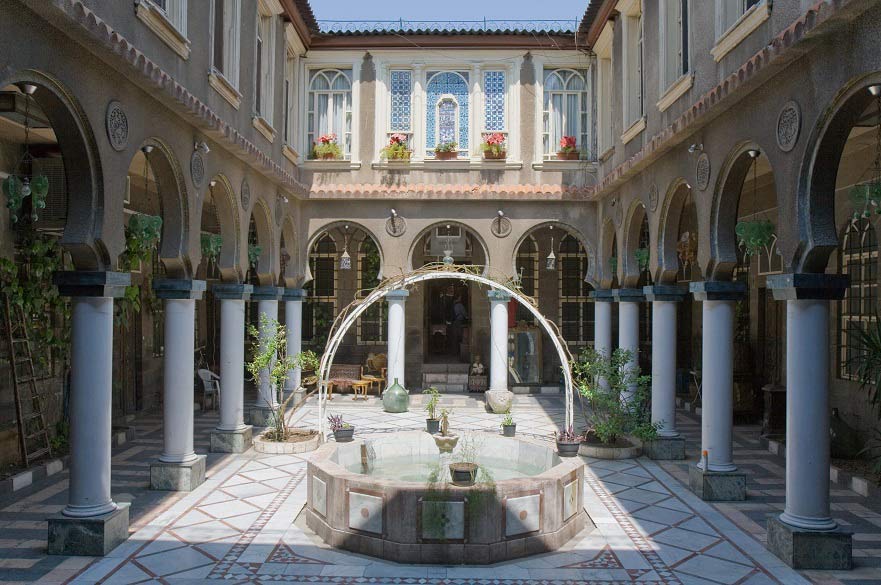Arabic
- Level(s) of Study: Short course
- Course Fee:
See Fees section
- Start Date(s): Week commencing 29 September 2025
- Duration: 22 weeks and oral assessment week
- Study Mode(s): Part-time
- Campus: City Campus
- Entry Requirements: More information
Introduction:
Learning a foreign language is a wonderful opportunity to not only learn the language itself, but also to reveal different perspectives on life, enabling you to explore new cultures through a different lens.
Languages open doors to your future. Check out How Languages Changed My Life for inspiring stories from learners across the world.
Our courses are more than just engaging classroom sessions supported by excellent online resources.
You’ll also have the option to take assessments and be awarded a Nottingham Trent University (NTU) Language Programme Certificate of Achievement.
What you’ll study
Our language classes are divided into Stages. Stage one is designed for real beginners whilst stage four is for improving and advanced learners. Check out the entry requirements to determine which stage is most appropriate for you. Some languages are available across levels in terms of the Common European Framework of Reference for Languages (CEFR). For more information, see our 'Awards' section.
To see which CEFR levels are taught at each ULP stage and find out more about CEFR, click here.
Online courses are also available. These will be included in the relevant Stage information.
“The online structure is very good and helpful in fitting in with my timetable, the class is small which helps for more one–to–one learning.”
Anonymous student feedback
- Arabic stage 1
- Arabic stage 1 & 2 accelerated (one year)
- Arabic stage 2
- Arabic stage 3
- Arabic stage 4
The course is suitable for real beginner learners of Arabic with no prior knowledge of the language.
It is delivered face-to-face on campus with an alternative option of online delivery (see below).
Course book
As the course book for this stage, we currently use the first half of Mastering Arabic Book 1 and its accompanying Mastering Arabic Activity Book 1.
Course content
The content of the module is topic-based and centres upon a range of everyday activities and situations which you may encounter either in a social or professional context in Arabic-speaking countries and communities.
Within the framework of each topic, you will develop the four language skills at a simple level and be introduced to a range of vocabulary, grammatical structures, and cultural knowledge relevant to this stage.
As you work through this module, you will have many opportunities to collaborate and interact with your fellow students.
You will engage in group tasks, activities, and discussions.
During the course you will learn the basic language structures used in everyday life in the Middle East and Arabic-speaking countries.
You will learn the script, how to speak and write in Arabic about basic personal details, family, jobs and studies.
You will learn how to describe places, things, and people and you will learn how to speak and write about yourself, your family members and friends.
You will also learn how to ask for directions.
You will be able to communicate at a basic level when shopping, and when you are in restaurants in an Arabic-speaking countries.
Course outcome
At the end of the course, you will have some elementary appreciation of Arabic grammar and structures.
Online Arabic Stage 1
Can’t come on campus? Join our new online module for beginners instead.
Weekly online sessions supplemented with flexible learning online activities using the newest online teaching software.
The online classes will be delivered by the teacher via MS Teams, and you can complete many interactive exercises in your own time.
The content, assessments and progression are the same in the face-to-face and the online classes.
The course is suitable for heritage speakers of Arabic, speakers of Arabic-influenced languages and/ or who have some prior experience of learning the language.
Learners would typically have some understanding of the Arabic alphabet system, know some basic phrases and / or be able to read but generally lack an understanding of the meaning, function and structural patterns of the language.
The course book, course content and learning outcomes are the same as stage 1 and 2.
The course is suitable for learners of Arabic with some knowledge of the language.
It is the right stage for you if you have successfully completed Arabic stage 1 or equivalent, e.g., GCSE at grade C or D or point 4 to 3 in Arabic or equivalent.
Course book
As the course book for this stage, we currently use the second half of Mastering Arabic Book 1 and Mastering Arabic Activity Book 1.
Course content
The content of the module is topic-based and centres upon a range of everyday activities and situations which you may encounter either in a social or professional context in the Arabic-speaking countries and communities.
Within the framework of each topic, you will develop the four language skills at a simple level and be introduced to a range of vocabulary, grammatical structures, and cultural knowledge relevant to this stage.
As you work through this module, you will have many opportunities to collaborate and interact with your fellow students.
You will engage in group tasks, activities, and discussions.
During the course you will learn about life in the Middle East and Arabic-speaking countries and how to give information about yourself and others, ask questions and interview others, give and understand information about holidays, vacation jobs, recount past events, food and favourite dishes, understand/give descriptions of people and places, etc.
Course outcome
At the end of the course, you will have deepened your appreciation of Arabic grammar and structures at an elementary level, and you will be able to write and speak about recent and past events and will be able to communicate at a reasonable level when shopping, and when you are in restaurants in an Arabic-speaking country.
Arabic stage 3 is the right stage for you if you have successfully completed Arabic stage 2, Arabic stage 1-2 or equivalent, e.g., GCSE at grade A or B or point 7 to 5 in Arabic, CEFR level A1 or equivalent.
Course content
The content of the module is topic-based and centres upon a range of everyday activities and situations which you may encounter either in a social or professional context in Arabic-speaking countries and communities.
Within the framework of each topic, you will develop the four language skills at a simple level and be introduced to a range of vocabulary, grammatical structures, and cultural knowledge relevant to this stage.
As you work through this module, you will have many opportunities to collaborate and interact with your fellow students.
You will engage in group tasks, activities, and discussions.
During the course you will study topics relating for example to the education, media, sport and leisure, work, and food and cooking.
Course outcome
At the end of the course, you will have deepened your appreciation of Arabic grammar and structures at this stage.
You will be able to make comparisons, discuss ideas, give your opinion and understand others’ opinions on selective topics.
You will typically learn how to write and speak about events in the past and your daily routine.
You will be encouraged to write your CV in Arabic and read other people’s CVs and suggest jobs for them.
Certification
In stages 3 and 4, you study towards level A2 (Common European Framework of Reference for Languages).
As the course book for this stage, we currently use the first half of Mastering Arabic Book 2 and Mastering Arabic Activity Book 2.
Arabic stage 4 is the right stage for you if you have successfully completed Arabic stage 3 or equivalent, e.g., GCSE grade A*, point 9-8 or AS level grade C or above in Arabic or equivalent.
Course book
As the course book for this stage, we currently use the second half of Mastering Arabic Book 2 and Mastering Arabic Activity Book 2.
Course content
The content of the module is topic-based and centres upon a range of everyday activities and situations which you may encounter either in a social or professional context in Arabic-speaking countries and communities
Within the framework of each topic, you will develop the four language skills at a simple level and be introduced to a range of vocabulary, grammatical structures, and cultural knowledge relevant to this stage.
As you work through this module, you will have many opportunities to collaborate and interact with your fellow students.
You will engage in group tasks, activities, and discussions.
During the course you will study topics relating, for example, to climate and environment, news and media, education and training, health and happiness, art and cinema, traditions and clothes in the Middle East.
Course outcome
At the end of the course, you will have deepened your appreciation of Arabic grammar and structures at this stage.
Typically, you will be able to write and speak about your intensions and wishes, make comparisons using different tenses, discuss ideas.
You will have looked at job applications and CV writing.
In addition, you will be able to give your opinion on selective topics supported by evidence.
How you’re taught
Your language study is designed in a flexible and blended learning mode which consists of taught sessions and guided self-study.
You will take part in two hours of weekly class contact time and will need to complete an additional two to four hours per week guided self-study.
Assessments will take place in class during University term time. To progress onto the next stage of your chosen language you must complete and pass all the assessments on the previous stage.
Campus and facilities
From access to our libraries and sports facilities, to subsidised bike hire, careers advice, and student discounts, as a ULP student you will be a full member of the NTU student body and are entitled to a student card and use of the University facilities.
Entry requirements
- Stage 1 (no prior knowledge or qualification needed)
- Stage 1-2 (accelerated stage for heritage speakers of Arabic and/or who have some prior experience of learning the language)
- Stage 2 (successful completion of Arabic stage 1 or equivalent, e.g. GCSE at grade C or D or point 4 to 3)
- Stage 3 (successful completion of Arabic stage 2, Arabic stage 1-2 or equivalent, e.g. GCSE at grade A or B or point 7 to 5, CEFR level A1)
- Stage 4 (successful completion of Arabic stage 3 or equivalent, e.g. GCSE grade A* or point 9 to 8 or AS level grade C or above)
Getting in touch
If you need more help or information, get in touch at ulp@ntu.ac.uk
Fees and funding
The course fee is £300
* Payment is due at the time of booking.
How to apply
You apply depending on the type of student you are. If you are not sure what type of student you are please check our ULP page, or contact the ULP Administration team.
For members of the public and NTU staff:
Check the dates, days and times and book your place via the NTU online store here.
For NTU supplementary students:
Check the dates, days and times and book your place via the NTU online store here.
Accredited students must complete the ULP Enquiry Form.
Your class will be added to your timetable or we’ll contact you if we need any further information.
Exchange students
Exchange students who are accredited should read the information for ULP Accredited Students.
You may register and pay for a ULP module via the ULP Online Store
Any questions?
Check our FAQs or contact the ULP Administration team:
- Email: ulp@ntu.ac.uk
- Telephone: +44 (0)115 848 2285



